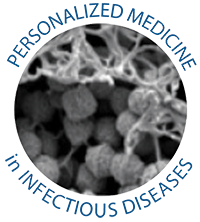FOR HEALTH CARE & RESEARCHERS
Severe acute infectious diseases, such as deep tissue infections and sepsis, are complex multifactorial diseases that can be caused by a variety of microbes. They are frequently complicated by septic shock and multi-organ failure. Despite modern medicine, the mortality is high, often exceeding 25%, and in the severe deep tissue infections, amputation is required in up to 15% of the cases.

Patients affected may be young immunocompetent individuals or individuals with co-morbidities, like cardiovascular diseases and diabetes mellitus. The fulminant, often rapid course of these invasive infections (in the order of hours), demands early diagnosis and prompt interventions. However, due to discrete and unspecific initial symptoms, scarce clinical findings and lack of specific biomarkers, there is a substantial risk for misdiagnosis and doctor’s delay. There is clearly an urgent need for improved diagnostics as well as novel treatment options to improve outcome in these patients.
Personalized medicine is a neglected, albeit much desired, development in the field of acute infectious diseases. The patient population is highly heterogenous with different pathogens, pathogenic mechanisms, as well as varying predisposing host factors, and importantly a dysregulated host response to infection is directly linked to severity and outcome of sepsis and NSTI. By virtue of the multifactorial nature of these infections, individualized approaches with tailored therapy for specific patient groups sharing disease mechanisms are likely to improve outcome of these patients. This concept is supported by the results obtained from the INFECT-project, in which a comprehensive systems medicine approach was used to delineate disease mechanisms in particular patient subgroups. The INFECT results, as well as clinical registry and biobank now offer a unique resource for the development of the recently started multinational projects, PerAID and PerMIT, that focuses on personalized medicine in severe acute infectious diseases. The two projects are ambitious covering both severe soft tissue infections and the large heterogeneous group of sepsis. Activities range from establishment of a Nordic platform for personalized medicine in infections, to translational advanced research including also prospective clinical studies. The research aims to identify disease signatures and biomarkers to be used for individualized therapy (right medicine for the right patient), and development of clinical decision support tools.















